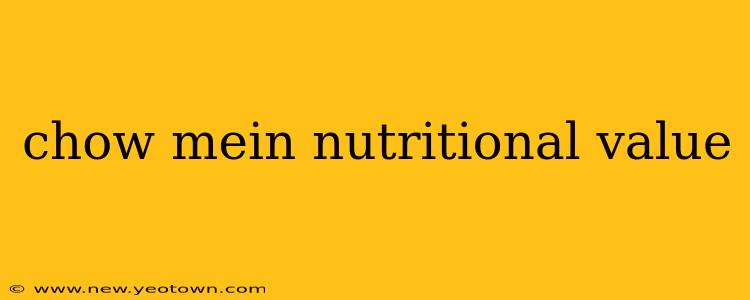Chow mein, a beloved stir-fried noodle dish, is a staple in many cuisines across the globe. But beyond its delicious taste and satisfying texture, what's the nutritional value of chow mein? Let's unravel the nutritional profile of this popular dish, exploring its varying components and offering insights into making healthier choices. Our journey begins not with the finished product, but with the fundamental building blocks: the noodles and the accompanying ingredients.
What are the main ingredients of chow mein and how do they impact its nutritional value?
The nutritional value of chow mein hinges significantly on its ingredients. The foundation, the noodles, can be made from wheat, rice, or even mung beans. Wheat noodles, the most common type, provide carbohydrates for energy, but are relatively low in other nutrients. Rice noodles offer a gluten-free alternative, while mung bean noodles boast higher protein content. The protein source, whether it's chicken, pork, beef, tofu, or shrimp, dramatically impacts the overall protein and fat content. Vegetables add crucial vitamins, minerals, and fiber, but their contribution varies greatly depending on the selection. Finally, the sauce, often soy-sauce based, contains sodium and sometimes added sugar.
How many calories are in a serving of chow mein?
The calorie count of chow mein varies wildly based on the ingredients and portion size. A typical serving of restaurant chow mein can range from 400 to 1000 calories or more. Dishes laden with meat, oil, and thick sauces will naturally be higher in calories. Vegetable-rich chow mein with lean protein sources and less oil will fall on the lower end of the spectrum. It’s important to remember that calorie counts are estimates, and precise numbers depend on the specific recipe and preparation method.
Is chow mein healthy? What are the potential health benefits?
The healthiness of chow mein is not a simple yes or no answer. A well-balanced chow mein, abundant in vegetables and lean protein, can be a part of a healthy diet. The vegetables contribute vitamins A, C, and K, along with essential minerals like potassium and iron. The protein supports muscle growth and repair. However, excessive sodium from soy sauce and added sugar from the sauce can offset any health benefits. Furthermore, the high carbohydrate content from the noodles can lead to blood sugar spikes if not consumed in moderation.
What are the potential health risks of eating chow mein regularly?
While occasional indulgence isn't a major concern, regular consumption of high-sodium, high-calorie chow mein can contribute to several health problems. Excessive sodium intake increases the risk of high blood pressure and heart disease. High sugar content leads to weight gain and increases the risk of type 2 diabetes. Frequent consumption of deep-fried chow mein, laden with unhealthy fats, increases the risk of cholesterol problems and obesity.
How can I make healthier chow mein at home?
Taking control of the ingredients is key to crafting a healthier version of chow mein at home. Opt for whole-wheat or brown rice noodles for increased fiber. Load up on a diverse range of colorful vegetables—broccoli, carrots, peppers, mushrooms, and leafy greens all add nutritional value and vibrant flavors. Choose lean protein sources like chicken breast, fish, tofu, or shrimp. Use a light hand with oil when stir-frying, and choose a low-sodium soy sauce or tamari as your base. Consider adding a touch of ginger and garlic for extra flavor instead of relying heavily on sugar.
Can I make vegetarian or vegan chow mein?
Absolutely! Vegetarian and vegan chow mein are delicious and easy to prepare. Simply replace meat with tofu, tempeh, or seitan for a substantial protein source. Amplify the vegetable portion, adding hearty mushrooms, firm tofu, and your favorite greens. Ensure your chosen sauce is vegetarian or vegan-friendly, and you're good to go!
By understanding the nutritional components and making conscious ingredient choices, you can enjoy the delicious flavors of chow mein while minimizing its potential downsides. Remember, moderation and mindful eating are crucial for a balanced diet.

